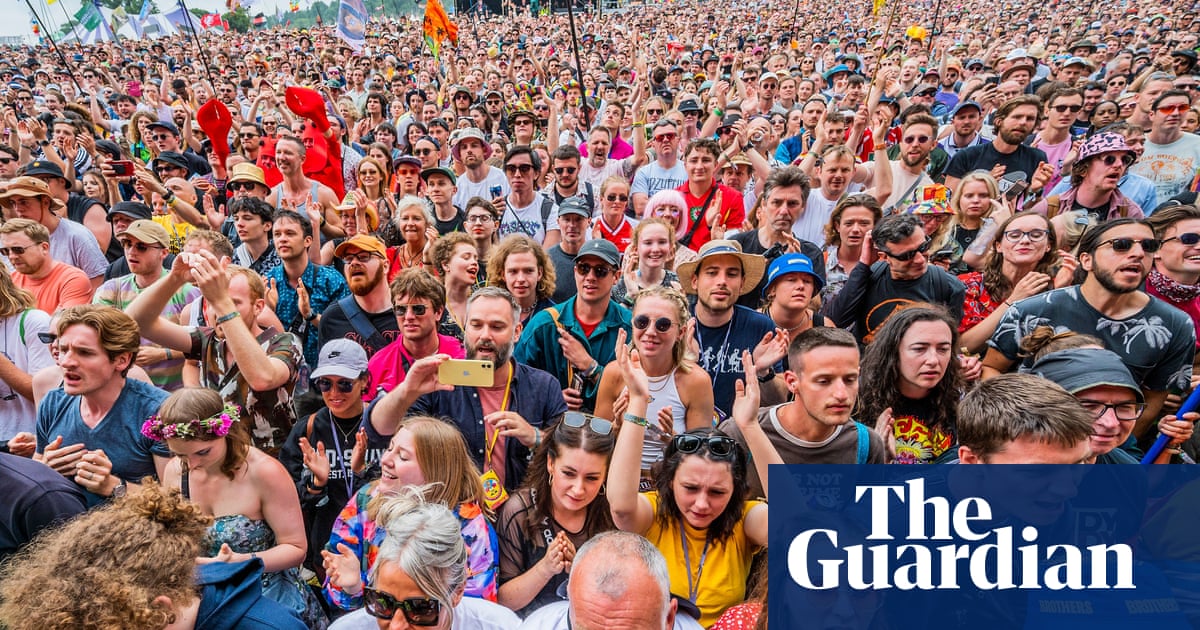From Monday to Friday, Jessica Heath works as a civil servant in central London – but when the weekend comes, it’s not time to relax. For the past two years, the 28-year-old has also worked evening shifts most Saturdays and Sundays at a nearby wine bar, with one clear aim – to save up for her summers.
Heath has been a hugemusic festivalfan since she first went to Leeds as a teenager and each year, including day events, she takes in at least seven, some as a volunteer. Without that and her second job, she’d never be able to afford it, she says.
It’s not just the cost of tickets, “it’s so many other things”, says Heath. “The coach, the food, the drink, all the other elements.” Her most recent trip to Glastonbury cost £900 in total – “an insane amount of money for less than a week”.
“It sounds like I’m saying, ‘Woe is me.’ I mean, I had an amazing time. But for me and a lot of my friends, you either do that or you go on holiday – you don’t do both.”
It has been a turbulent few years in Britain’s festival industry, with huge commercial giants and smaller indies buffeted by a post-pandemic, post-Brexit surge in costs that leda record 72 eventsto postpone, cancel, or fold in 2024. Event organisers, often despite their best efforts, have beenforced to raise ticket prices, and are having to innovate to sell them. While festivalgoers caught in an ongoing cost-of-living squeeze are, in many cases, having to innovate to afford to buy tickets.
As a result,industry analysis shows, the way festival tickets are bought and sold is changing. Pre-pandemic, some opted to pay in instalments; since then, however, the numbers opting to buy this way has soared, with ticket service Skiddle reporting a 48% increase in 2023/24, a figure expected to rise further this year.
“My view would be, if you don’t offer split payments, then you really shouldn’t be running a festival in 2025,” says John Rostron, the CEO of theAssociation of Independent Festivals. Almost all festivals – even day events – now offer them, he says, often spread over a full 12 months.
Early bird tickets, too, have boomed – up five-fold in 2023/24 at Skiddle. In part, says Rostron, that’s driven by live events beingforced to lock in their actsever earlier, but it also means some festivals are selling out in record time – even in early autumn, almost a year before their event.
Many Guardian readers have said festival financing was a year-long pursuit. Charlotte Westwell, 23, a coffee shop supervisor from Wigan, said she and her partner had got the bug at Download Pilot in 2021, and have gone to two or three a year since then.
Sign up toThe Guide
Get our weekly pop culture email, free in your inbox every Friday
after newsletter promotion
To do so, they snap up early bird tickets on payment plans. “Then, after each festival, I set up a savings pot, and set up a standing order for a set amount every month, as well as a cash jar for any spare bits of cash. But we inevitably need to dip into savings for various reasons, wind up with very little by festival season, and whack it all on the credit card in an endless cycle of festival debt.”
But it’s worth it, she says. “I mean, we’re massively, massively into live music.”
Many readers said they were able to get tickets only by volunteering – “a wonderful community” in itself, according to Charlotte Lovie, 55, a college lecturer from Southsea in Hampshire, who has worked in exchange for a ticket at several festivals for each of the past four years.
But even coming by a volunteer place can be tough, and some have concerns that rising costs could make festivals increasingly inaccessible to those on low incomes.
It’s something event organisers are acutely aware of, with some, such as thealternative music and arts festival Supersonic, inviting better-off attenders tobuy “solidarity” ticketsto subsidise a free or cheaper one for those from marginal groups.
“The ethos of the festival is about this sense of community and people coming together,” says the Supersonic artistic director, Lisa Meyer. “And if that becomes elitist because it’s so expensive, then it’s not really for everyone.”
Stuart Walker, 52, from Nottingham, says he and his partner had initially decided they couldn’t afford their usual couple of festivals this year: “It feels like a much bigger luxury than it used to be, and I’d have to cut back on a lot more things.” In the end, though, they decided to dip into their savings, and will go to Beautiful Days and Latitude later in the summer.
Why? “We just decided, what’s the point of life if you don’t experience joy? That’s why.”
